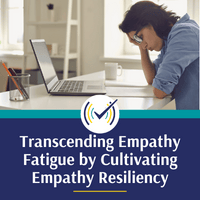Transcending Empathy Fatigue by Cultivating Empathy Resiliency
Enroll in the Online Self-Study and complete the training on your own schedule.
3 CE Credits available for behavioral health clinicians
In traditional Native American teaching, each time a medicine man/woman heals someone, you give away a piece of yourself until at some point you require healing. The journey to become a modern-day healer involves an understanding that the professional helper at some point in time may also become wounded and require healing. Dr. Stebnicki coined the term “empathy fatigue” in 1998 and has been conceptually describing, evaluating, and treating the experience of this phenomenon ever since. Empathy fatigue results from a state of psychological, emotional, mental, physical, spiritual, and occupational exhaustion that occurs as the counselors’ wounds are continually revisited by their clients’ life stories of stress, traumatic stress, grief, loss, chronic illness, and disability. There appears to be a “shadow side” of empathy during the therapeutic relationship as professional helpers enter the deeply emotional experience of their client’s world of extraordinary stressful and traumatic events. Thus, professional helpers are at risk for the experience of empathy fatigue. This course challenges participants to: (a) engage in self-exploration of your personal and professional growth potential, (b) develop self-care practices that are both practical for your life, yet create deeper meaning for personal integration and insight, (c) model self-care practices for your clients that form the foundation of the therapeutic relationship and earning the circle of trust, and (d) explore multiple therapeutic resources that empower both you and your clients for living life in optimal wellness. Overall, Transcending Empathy Fatigue utilizes guided self-exploration, self-assessment, and development of your intuitive capabilities to empower your mind, body, and spirit for personal and professional growth. An extensive workbook with over 50 pages of material is included when you enroll in this course.
- Transcending Empathy Fatigue by Cultivating Empathy Resiliency
- Description
- Learning Objectives
- Instructor
- CE Hours
- How to Complete the course and earn CEs
- Course Policies
- Who Should Attend
- Teaching Methods
- Course Availability
Select each tab above to view specific details of this course
In traditional Native American teaching, each time a medicine man/woman heals someone, you give away a piece of yourself until at some point you require healing. The journey to become a modern-day healer involves an understanding that the professional helper at some point in time may also become wounded and require healing. Dr. Stebnicki coined the term “empathy fatigue” in 1998 and has been conceptually describing, evaluating, and treating the experience of this phenomenon ever since. Empathy fatigue results from a state of psychological, emotional, mental, physical, spiritual, and occupational exhaustion that occurs as the counselors’ wounds are continually revisited by their clients’ life stories of stress, traumatic stress, grief, loss, chronic illness, and disability. There appears to be a “shadow side” of empathy during the therapeutic relationship as professional helpers enter the deeply emotional experience of their client’s world of extraordinary stressful and traumatic events. Thus, professional helpers are at risk for the experience of empathy fatigue. This course challenges participants to: (a) engage in self-exploration of your personal and professional growth potential, (b) develop self-care practices that are both practical for your life, yet create deeper meaning for personal integration and insight, (c) model self-care practices for your clients that form the foundation of the therapeutic relationship and earning the circle of trust, and (d) explore multiple therapeutic resources that empower both you and your clients for living life in optimal wellness. Overall, Transcending Empathy Fatigue utilizes guided self-exploration, self-assessment, and development of your intuitive capabilities to empower your mind, body, and spirit for personal and professional growth. An extensive workbook with over 50 pages of material is included with course registration.
This course provides 3+ hours of video training, a post-test, an evaluation and a workbook.
This course was recorded June 9, 2023.
Upon completion of this training professionals will be able to do the following:
- Identify and evaluate the cognitive, behavioral, spiritual, process skills, emotional, physical, and occupational characteristics of the empathy fatigue experience using the Global Assessment of Empathy Functioning (GAEF-II) model.
- Explore the experience and impact of empathy fatigue as it relates to the professional’s ethical responsibility of maintaining optimal self-care while providing competent services during intense therapeutic interactions with clients’ experience of extraordinary stressful and traumatic events.
- Illustrate self-care strategies for the prevention, preparation, and reduction of the empathy fatigue experience cultivating wellness, behavioral health, mindfulness stress reduction, and other self-care approaches to increase empathy resiliency for optimal wellness.
Mark A. Stebnicki, Ph.D., LCMHC, DCMHS, CRC, CMCC
Mark A. Stebnicki, Ph.D., LCMHC, DCMHS, CRC, CMCC is Professor Emeritus and former Coordinator of the Military and Trauma Counseling (MTC) Certificate Program which he developed in 2015 in the Department of Addictions and Rehabilitation at East Carolina University. Dr. Stebnicki also developed the national Clinical Military Counseling Certificate (CMCC) in 2016; a 12 hr CE program offered nationally through the Telehealth Certificate Institute. Dr. Stebnicki has been a counselor educator, researcher, practitioner with over 30 years’ experience in rehabilitation and mental health. He has practiced and published in the areas related to stress, traumatic stress, disaster mental health response, and the psychosocial aspects of chronic illness and disability. His primary focus currently is working with military service members, veterans, veterans with disabilities, and military families. Dr. Stebnicki has published 10 professional books, most recently two books published in 2021 through the American Counseling Association/Wiley Publishing titled: Clinical Military Counseling: Guidelines for Practice and Counseling Practice During Phases of a Pandemic Virus. He also has published 40 journal articles and book chapters, and has provided over 100 presentations nationally, regionally, and statewide. He has served on many statewide and national professional counseling boards.
Credit Hours: CEs provided with this course include 3 continuing education hours of credit.
Counselors: Telehealth Certification Institute LLC has been approved by NBCC as an Approved Continuing Education Provider, ACEP No. 6693. Programs that do not qualify for NBCC credit are clearly identified. Telehealth Certification Institute LLC is solely responsible for all aspects of the programs.
Telehealth Certification Institute LLC is recognized by the New York State Education Department's State Board for Mental Health Practitioners as an approved provider of continuing education for Licensed Mental Health Counselors #MHC-0048.
Marriage and Family Therapists: Many MFT licensing boards accept our courses or one of the approvals which we have from professional associations. You can check with your board to determine if this course would be accepted by your licensing board.
Social Workers: Telehealth Certification Institute LLC, #1609, is approved as an ACE provider to offer social work continuing education by the Association of Social Work Boards (ASWB) Approved Continuing Education (ACE) program. Regulatory boards are the final authority on courses accepted for continuing education credit. ACE provider approval period: 05/02/2024 – 05/02/2027. Social workers completing this course receive 3 clinical continuing education credits.
Telehealth Certification Institute LLC is recognized by the New York State Education Department's State Board for Social Work as an approved provider of continuing education for Licensed Social Workers #SW-0435.
Addiction Professionals: This course has been approved by Telehealth Certification Institute LLC, as a NAADAC Approved Education Provider, for educational credits. NAADAC Provider #193104, Telehealth Certification Institute LLC is responsible for all aspects of the programing.
Psychologists: Telehealth Certification Institute LLC is approved by the American Psychological Association to sponsor continuing education for psychologists. Telehealth Certification Institute LLC maintains responsibility for this program and its content.
Telehealth Certification Institute LLC is recognized by the New York State Education Department's State Board for Psychology as an approved provider of continuing education for Licensed Psychologists #PSY-0128.
Art Therapists: Telehealth Certification Institute LLC is recognized by the New York State Education Department's State Board for Mental Health Practitioners as an approved provider of continuing education for Licensed Creative Arts Therapists #CAT-0093.
Other Professionals: This activity qualifies for 180 minutes of instructional content as required by many national, state and local licensing boards and professional organizations. Retain your certificate of completion and contact your board or organization for specific filing requirements.
This is a non-interactive, self-study course.
To receive your certificate of completion indicating CEs, you must complete the course in its entirety.
Online courses are completed by registering, logging in, navigating to your course using the menu (My Courses – the Course Title), completing all of the modules, completing and passing the post-test, and completing the course evaluation.
Live Webinar courses are completed by registering, logging in to this website, navigating to your course using the menu (My Courses – the Course Title), attending the full course via webinar, submitting your attendance, and completing the post-test and course evaluation online.
Psychologists and other professionals seeking CE credit through our approval with the American Psychological Association are asked, but not required, to complete the course evaluation before obtaining their certificate of completion, however passing a post-test for online self-study courses, and submitting one's attendance for live on-site and live webinars is required.
You can receive your certificate of completion by logging onto this website, navigating to the course using the menu (My Courses – the Course Title), scroll to the bottom of your course, and click on your certificate to either download it or print it.
Directions for completing a course can be found by clicking here.
Accommodations for Individuals with Disabilities
Click here to view our Accommodations for Individuals with Disabilities.
Cancellation Policy
Refunds are offered within the first 30 days for courses which have not been completed. There is a 10% service fee for refunds.
Grievance Policy
This course is intended for clinicians who provide behavioral health services.
Teaching methods for this course include recorded lectures, videos, a post-test, and a course evaluation. The course may include required reading.
This program was recorded on June 9, 2023
You have six months to access online courses from the time of purchase.

Mark A. Stebnicki
Ph.D., LCMHC, DCMHS, CRC, CMCC
Mark A. Stebnicki, Ph.D., LCMHC, DCMHS, CRC, CMCC is Professor Emeritus and former Coordinator of the Military and Trauma Counseling (MTC) Certificate Program which he developed in 2015 in the Department of Addictions and Rehabilitation at East Carolina University. Dr. Stebnicki also developed the national Clinical Military Counseling Certificate (CMCC) in 2016; a 12 hr CE program offered nationally through the Telehealth Certificate Institute. Dr. Stebnicki has been a counselor educator, researcher, practitioner with over 30 years’ experience in rehabilitation and mental health. He has practiced and published in the areas related to stress, traumatic stress, disaster mental health response, and the psychosocial aspects of chronic illness and disability. His primary focus currently is working with military service members, veterans, veterans with disabilities, and military families. Dr. Stebnicki has published 10 professional books, most recently two books published in 2021 through the American Counseling Association/Wiley Publishing titled: Clinical Military Counseling: Guidelines for Practice and Counseling Practice During Phases of a Pandemic Virus. He also has published 40 journal articles and book chapters, and has provided over 100 presentations nationally, regionally, and statewide. He has served on many statewide and national professional counseling boards.




The course was so informative and I was glued to my screen for the entire duration. I received so much knowledge concerning ethics in telehealth and I am greatly encouraged to read about all the standards and policies that pertain to my practice. Thank you!.